

Themes in Nazi propaganda. The propaganda of the National Socialist German Workers' Party regime that governed Germany from 1933 to 1945 promoted Nazi ideology by demonizing the enemies of the Nazi Party, notably Jews and communists, but also capitalists and intellectuals.
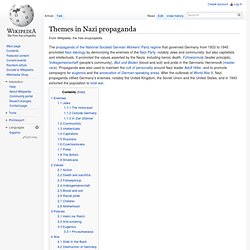
It promoted the values asserted by the Nazis, including heroic death, Führerprinzip (leader principle), Volksgemeinschaft (people's community), Blut und Boden (blood and soil) and pride in the Germanic Herrenvolk (master race). Propaganda was also used to maintain the cult of personality around Nazi leader Adolf Hitler, and to promote campaigns for eugenics and the annexation of German-speaking areas. After the outbreak of World War II, Nazi propaganda vilified Germany's enemies, notably the United Kingdom, the Soviet Union and the United States, and in 1943 exhorted the population to total war. Enemies[edit] Jews[edit] Poster for occupied Poland: "JEWS-SUCKING LOUSE-TYPHUS" Nazi propaganda. Propaganda was used by the NSDAP in the years leading up to and during Adolf Hitler's leadership of Germany (1933–1945).
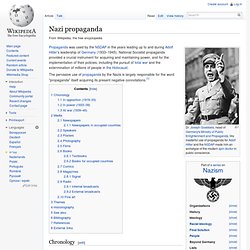
National Socialist propaganda provided a crucial instrument for acquiring and maintaining power, and for the implementation of their policies, including the pursuit of total war and the extermination of millions of people in the Holocaust. The pervasive use of propaganda by the Nazis is largely responsible for the word "propaganda" itself acquiring its present negative connotations.[1] Chronology[edit] In opposition (1919–33)[edit] Mein Kampf contains the blueprint of later Nazi propaganda efforts.
"Propaganda must always address itself to the broad masses of the people. (...) As to the methods to be employed, he explains: Hitler put these ideas into practice with the reestablishment of the Völkischer Beobachter, a daily newspaper published by the Nazi Party (NSDAP) from February 1925 on, whose circulation reached 26,175 in 1929. In power (1933–39)[edit] Media[edit] Goebbels on Hitler as a Speaker. Background: This is Goebbels’ discussion of Hitler’s speaking ability, taken from an illustrated book on Hitler published in 1936.
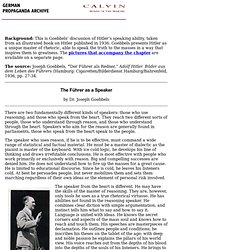
Goebbels presents Hitler as a unique master of rhetoric, able to speak the truth to the masses in a way that inspires them to greatness. The pictures that accompany the chapter are available on a separate page. The source: Joseph Goebbels, “Der Führer als Redner,” Adolf Hitler. Bilder aus dem Leben des Führers (Hamburg: Cigaretten/Bilderdienst Hamburg/Bahrenfeld, 1936, pp. 27-34. The Führer as a Speaker by Dr. There are two fundamentally different kinds of speakers: those who use reasoning, and those who speak from the heart.
The speaker who uses reason, if he is to be effective, must command a wide range of statistical and factual material. The speaker from the heart is different. These rhetorical geniuses are the drummers of fate. As any great man, a gifted speaker has his individual style. German Propaganda Archive (Guide Page) Nazi and East German Propaganda Guide Page Propaganda was central to Nazi Germany and the German Democratic Republic.
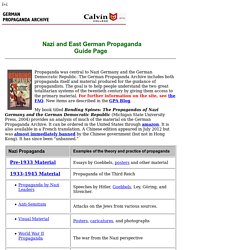
Jozef Gebels: Znanje i propaganda. Gebelsov govor iz 1928.
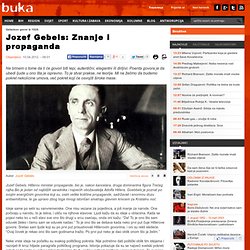
Ne brinem o tome da li će govori biti lepi, autentični, elegantni ili dirljivi. Poenta govora je da ubedi ljude u ono šta je ispravno. To je stvar prakse, ne teorije. Mi ne želimo da budemo pokret nekolicine umova, već pokret koji će osvojiti široke mase. Jozef Gebels, Hitlerov ministar propagande, bio je, nakon kancelara, druga dominantna figura Trećeg rajha.Bio je jedan od najbližih saradnika i najvećih obožavatelja Adolfa Hitlera. Ideje same po sebi su vanvremenske. Neke vrste ideja na početku su svakog političkog pokreta. Za nekoga se može reći da ima širok pogled na svet, ali ne zbog toga što on zna ili čita mnogo, već zato što on celokupan život posmatra sa jedne tačke gledišta i zato što sve meri pomoću jednog standarda. Ako razvijem ovu jednostavnu i jasnu ideju u sistem ljudske težnje, želje i aktivnosti, ja imam širok pogled na svet. Sada mi moramo da vidimo ko je taj koji nosi, koji prosleđuje, koji čuva ove ideje.
Svaki pokret počinje kao partija. Untitled. Goebbels and today's mass mind control : Part OneOnline Journal April 23, 2001 How PR opinion-shapers turn the people against their own interests Today's right-wing public relations spin has much in common with the propaganda methods of Hitler's PR man, Joseph Goebbels.
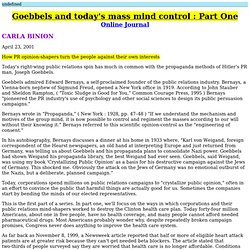
Goebbels admired Edward Bernays, a self-proclaimed founder of the public relations industry. Bernays, a Vienna-born nephew of Sigmund Freud, opened a New York office in 1919. Bernays wrote in "Propaganda," ( New York : 1928, pp. 47–48 ) "If we understand the mechanism and motives of the group mind, it is now possible to control and regiment the masses according to our will without their knowing it. " In his autobiography, Bernays discusses a dinner at his home in 1933 where, "Karl von Weigand, foreign correspondent of the Hearst newspapers, an old hand at interpreting Europe and just returned from Germany, was telling us about Goebbels and his propaganda plans to consolidate Nazi power.
This is the first part of a series. JSTOR Database - UHS Virtual Library - View All Guides at University High School. GHDI - Document - Chapter. XI.
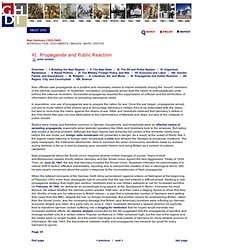
Propaganda and Public Reaction print version Overview | I. Building the Nazi Regime | II. The Nazi State | III. Nazi officials saw propaganda as a positive and necessary means to inspire solidarity among the “sound” members of the German population. Viewcontent.cgi (application/pdf Object)